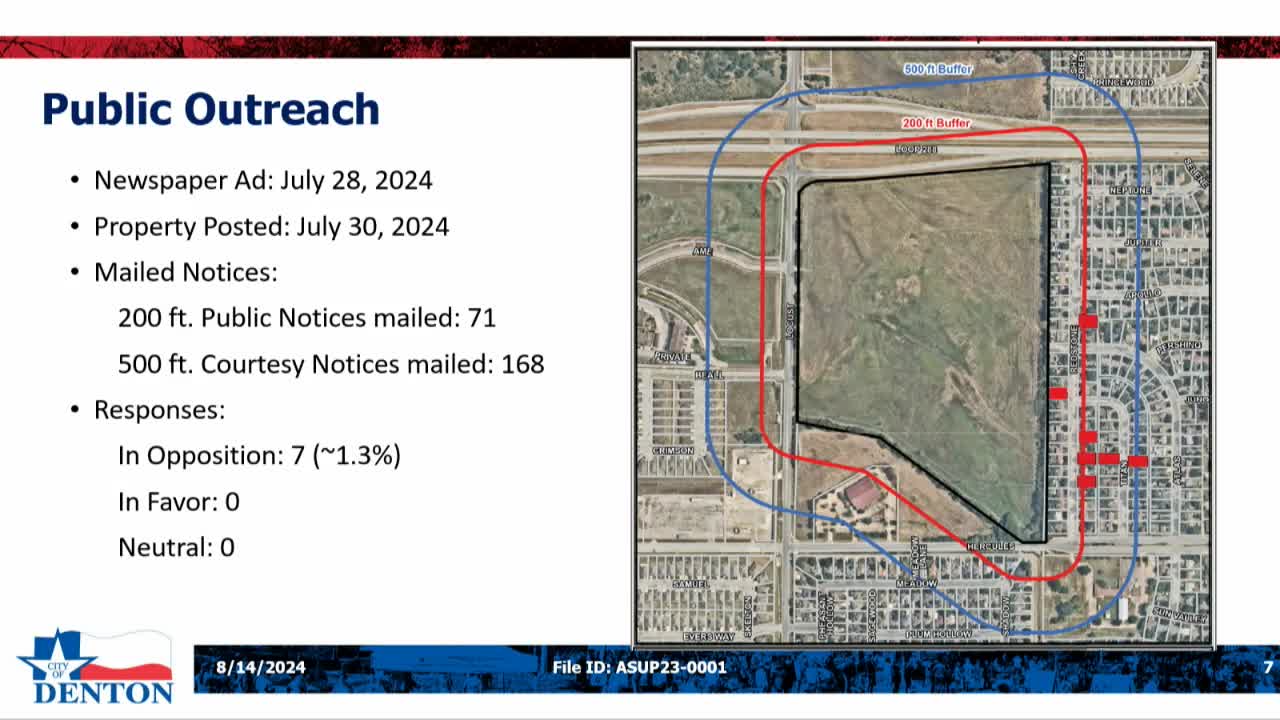Community Divided Over Controversial Development Proposal
August 14, 2024 | Denton City, Denton County, Texas
This article was created by AI summarizing key points discussed. AI makes mistakes, so for full details and context, please refer to the video of the full meeting. Please report any errors so we can fix them. Report an error »

In a recent government meeting, officials discussed a proposed amendment to a Special Use Permit (SUP) for a multifamily development, which has drawn mixed reactions from the community. The staff recommended approval of the amendment, which would replace the original conditions of the SUP while maintaining the core elements of the project. Despite receiving seven responses in opposition, the applicant, represented by civil engineer Brian Bridgewater, emphasized that the changes involve a reduction in units and an enhancement of amenities, suggesting that the project remains fundamentally the same.
Commissioner Thagard raised concerns about the concentration of opposition from a specific neighborhood area, questioning whether there were particular reasons for the pushback. The staff noted that the development was designed to limit vehicle access to the neighboring area, making it difficult to pinpoint the reasons for the opposition.
During the meeting, the developer acknowledged that they had not conducted additional outreach regarding the recent changes, relying instead on previous community engagement efforts. This lack of follow-up was highlighted by a resident who expressed concerns about the need to reconnect with those who opposed the project initially to understand their ongoing concerns.
The discussion also touched on traffic management, particularly regarding access points and the installation of a signalized intersection, which is planned to coincide with the first phase of development. The developer assured that the traffic flow would be managed effectively, despite some challenges posed by the proximity of the new traffic light to existing roads.
Ultimately, the commission voted to approve the amendment, with some members expressing reservations about the lack of recent community engagement. The meeting concluded with a commitment to improve communication and outreach efforts in future projects, ensuring that community voices are heard and considered in the planning process.
Commissioner Thagard raised concerns about the concentration of opposition from a specific neighborhood area, questioning whether there were particular reasons for the pushback. The staff noted that the development was designed to limit vehicle access to the neighboring area, making it difficult to pinpoint the reasons for the opposition.
During the meeting, the developer acknowledged that they had not conducted additional outreach regarding the recent changes, relying instead on previous community engagement efforts. This lack of follow-up was highlighted by a resident who expressed concerns about the need to reconnect with those who opposed the project initially to understand their ongoing concerns.
The discussion also touched on traffic management, particularly regarding access points and the installation of a signalized intersection, which is planned to coincide with the first phase of development. The developer assured that the traffic flow would be managed effectively, despite some challenges posed by the proximity of the new traffic light to existing roads.
Ultimately, the commission voted to approve the amendment, with some members expressing reservations about the lack of recent community engagement. The meeting concluded with a commitment to improve communication and outreach efforts in future projects, ensuring that community voices are heard and considered in the planning process.
View full meeting
This article is based on a recent meeting—watch the full video and explore the complete transcript for deeper insights into the discussion.
View full meeting
